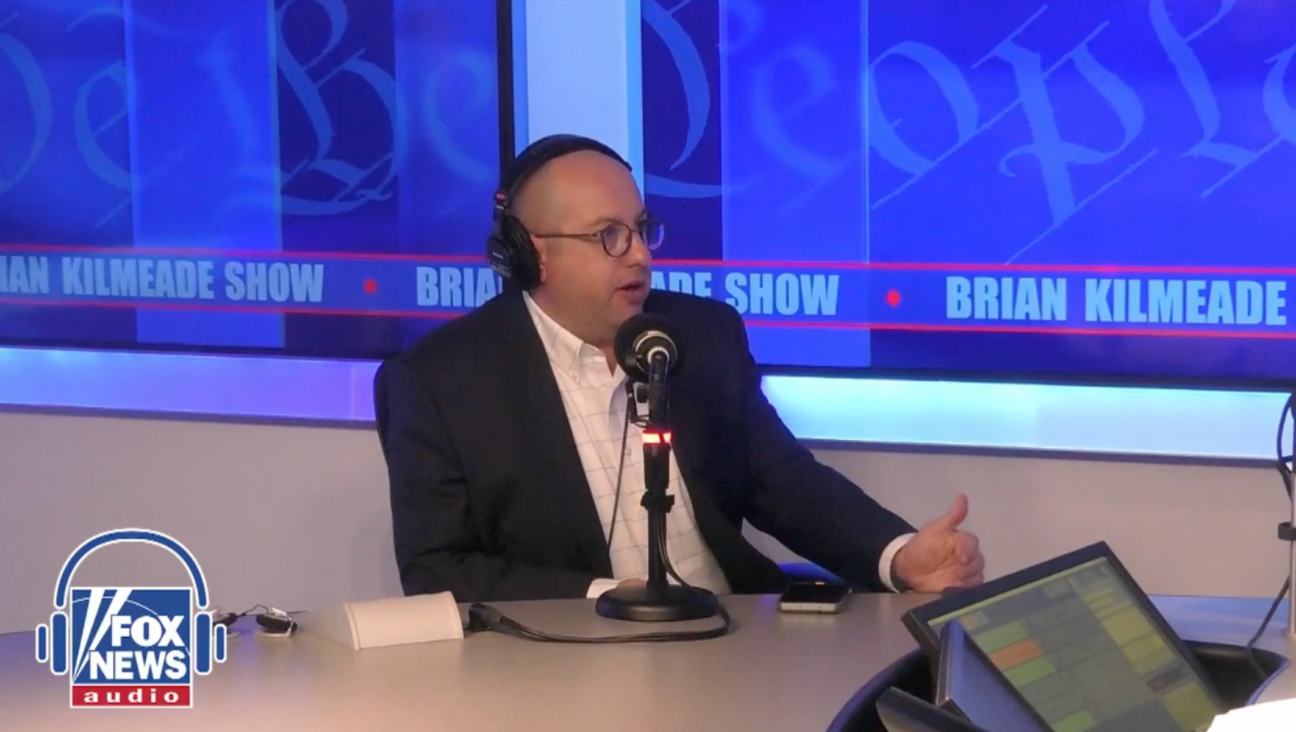Jewish Day Schools’ Dirty Little Secret

Black Eye: Jewish day schools are great places to get an education. But most of them do not do a great job accommodating children with disabilities.
Two annual events in the Jewish community took place this week — the North American Jewish Day School Conference and the start of Jewish Disabilities Awareness Month. Perhaps not coincidentally, despite the fact that the Day School conference is the largest in history with more than 1,000 educators and supporters gathering in Washington, it does not offer a session on educating and respecting children with disabilities.
So here’s the dirty secret of the Jewish community. While Jews have been at the forefront of civil rights for African Americans, gays, women and immigrants, Jewish Day schools barely do more than “talk the talk” when it comes to including children with disabilities.
If you have a child with a disability who wants a Jewish education, it’s hard to get them accepted and supported. Many parents will find that if their kids are slightly outside the mold of the “cookie cutter kids” that are smoothly on their way to excellent universities and successful careers, that their child might, just might get accepted. If they are lucky, there will be some special support for them child in the early years of school. But if their child’s learning, physical or other differences become too inconvenient eventually they will be called to the school so they can “counsel out” your child.
They will be told ever-so-nicely how sorry they are that they can’t accommodate this child. They might even give you a free lecture about how grateful you should be (as your child is being dismissed) that the school previously offered your child a time slot for the public school speech therapist to come in or tutor. After all, none of that was offered at Jewish day schools decades ago.
As if that could make you and your child feel better and get the education you wanted. Additionally, parents will find that if their child has “behaviors” or mental health issues, certain physical disabilities, seizures, or a lack of “normative” social skills due to Autism Spectrum Disorder, their child simply won’t ever be accepted to many of the Jewish day schools.
Worse yet, the school will accept the child briefly, until they discover that they have not put the proper supports in place. Then something bad will happen like an “unexpected behavior” and the child will be unceremoniously thrown out. The parent might be offered a discussion on the importance of making schools “safe and successful” for the other children who don’t have disabilities.
The parent will feel the full sting of rejection for their child. The combination of hypocrisy, humiliation and hurt may mean that the Jewish community loses this child and family forever.
This isn’t an isolated problem. Approximately 200,000 Jewish children in America have some sort of disability. Given that there is a link between the age of a father and Autism – and that Jews wait longer than most other group in America to have children – this is a growing challenge.
Jewish private schools are not the only schools to deal with these phenomena. Twenty percent of Americans have a disability and fully fifty-one percent of American likely voters either have a disability or a loved one with a disability.
Many public schools, as well as secular private schools for students with disabilities, are quite excellent. Many of their students, because they get the right supports, will go on to major success. Indeed, speaking at a general session at the conference, Nathan Diament of the Orthodox Union pointed out that Jewish day schools can qualify for funds from the government to serve kids with disabilities – but many don’t bother to apply. Rabbi David Saperstein, speaking at the same session, also added that it is inexcusable for Jewish day schools to continue to reject children because they have a disability.
But things are so bad in Jewish day schools in New York City that some parents of kids with disabilities commute from Boston to jobs there. Why Boston? Because the Jewish community in Boston has made it a priority to ensure that every child who wants a Jewish education, regardless of their abilities or differences, can get one.
Indeed, when I reached the spokesperson for the Jewish Day School conference and asked if there were any sessions on working with children with disabilities, she pointed out that Arlene Remz of Boston’s outstanding Gateways spoke at a breakout at the conference two years ago and is attending it this year. It did not occur to her that the best practitioner of inclusion should be a regular feature at every conference.
Now a new Jewish day school is about to start in New York that will only serve Jewish kids with disabilities – because no other Jewish day school there will serve them. This is a tragedy because these kids shouldn’t have to be in a separate school. Since Brown vs. the Board of Education blacks haven’t been relegated to separate schools. Why should children with disabilities? Public schools and recreational programs have made inclusion work. Why can’t private schools?
Judaism teaches that every Jew is created in the image of God. Additionally, it teaches that when Jews were slaves in Egypt, God’s instrument was a person with a disability. Moses was “slow of speech and tongue.” So how can a religious school on the one hand teach that God picked Moses to lead, and on another hand exclude a child who is non-verbal?
America would not tolerate it if a prestigious school rejected a child because they were Jewish. Why do Jews continue to tolerate the blatant discrimination in our religious schools?
Mind you, many private schools, Jewish included, will explain that they are doing a lot more for kids with mild disabilities than they did decades ago. Indeed, progress has been made and there are pockets of excellence and teachers who care. There are wonderful programs in Chicago, Baltimore and Miami that serve some children, for example. There indeed are tutors and therapists coming into some of the schools. The tent has expanded, and that is a good thing. But few if any of the school have an inclusion committee. They are lacking board members who have children with disabilities and who focus on those issues. Fewer still have board members with a disability. Few regularly ask the parents of children with special needs, and those students, how they feel about the services and experiences they are getting. Most are not yet looking at how online learning, through places such as the Khan Academy can enable children who learn at different levels to excel.
As Jews, all Jewish institutions reflect on us. So when we don’t work for change, we are all guilty of bigotry. When our Jewish day schools discriminate, we discriminate.
Ending the discrimination of people with disabilities in the Jewish community is not only good for the people with disabilities. It’s good for those who don’t have disabilities as well. After all, without Moses, we’d still be in Egypt.
Jennifer Laszlo Mizrahi is Co-Founder and Director of the Mizrahi Family Charitable Trust and President of Laszlo Strategies.
The Forward is free to read, but it isn’t free to produce

I hope you appreciated this article. Before you go, I’d like to ask you to please support the Forward.
At a time when other newsrooms are closing or cutting back, the Forward has removed its paywall and invested additional resources to report on the ground from Israel and around the U.S. on the impact of the war, rising antisemitism and polarized discourse.
Readers like you make it all possible. We’ve started our Passover Fundraising Drive, and we need 1,800 readers like you to step up to support the Forward by April 21. Members of the Forward board are even matching the first 1,000 gifts, up to $70,000.
This is a great time to support independent Jewish journalism, because every dollar goes twice as far.
— Rachel Fishman Feddersen, Publisher and CEO
2X match on all Passover gifts!
Most Popular
- 1

News A Jewish Republican and Muslim Democrat are suddenly in a tight race for a special seat in Congress
- 2

Fast Forward The NCAA men’s Final Four has 3 Jewish coaches
- 3

Film & TV What Gal Gadot has said about the Israeli-Palestinian conflict
- 4

Fast Forward Cory Booker proclaims, ‘Hineni’ — I am here — 19 hours into anti-Trump Senate speech
In Case You Missed It
-

Fast Forward Senate rejects Bernie Sanders’ proposal to block some weapons sales to Israel
-

Fast Forward Sotheby’s to auction earliest known kiddush cup
-

Opinion Trump’s new tariffs on Israel are a BDS dream come true
-

Fast Forward Jerusalem Post editor Zvika Klein, arrested in ‘Qatar-gate,’ says he’s being unfairly prosecuted for his reporting
-
Shop the Forward Store
100% of profits support our journalism
Republish This Story
Please read before republishing
We’re happy to make this story available to republish for free, unless it originated with JTA, Haaretz or another publication (as indicated on the article) and as long as you follow our guidelines.
You must comply with the following:
- Credit the Forward
- Retain our pixel
- Preserve our canonical link in Google search
- Add a noindex tag in Google search
See our full guidelines for more information, and this guide for detail about canonical URLs.
To republish, copy the HTML by clicking on the yellow button to the right; it includes our tracking pixel, all paragraph styles and hyperlinks, the author byline and credit to the Forward. It does not include images; to avoid copyright violations, you must add them manually, following our guidelines. Please email us at [email protected], subject line “republish,” with any questions or to let us know what stories you’re picking up.














